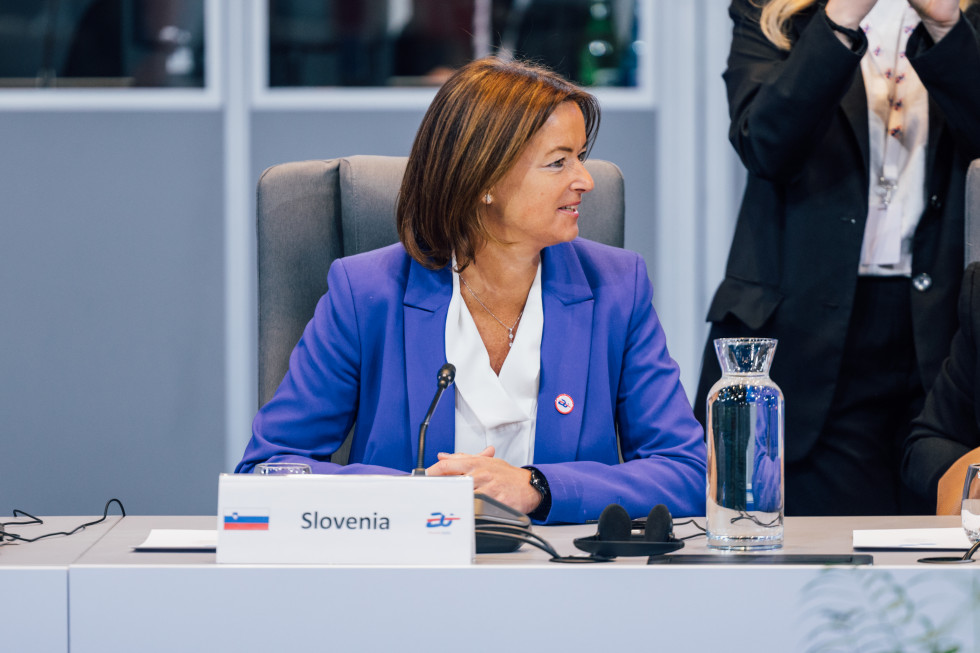Minister Fajon calls for additional sanctions against Israel

Minister Tanja Fajon at the Informal Meeting of EU Foreign Ministers | Author MZEZ
EU ministers agreed on the need for action on the Middle East and in particular the situation in Gaza, where humanitarian aid has been blocked by Israel for months. Minister Tanja Fajon said: "The EU must be clear, loud and united in demanding that Israel immediately delivers aid to civilians and stops these flagrant violations of international and humanitarian law. I called for additional sanctions against Israeli settlers in the West Bank, a review of trade policy with Israel and continued efforts for an immediate ceasefire, the release of all hostages and a two-state solution. The window of opportunity for the latter is rapidly closing and the world is failing the test of humanity, justice and the protection of innocent civilians.”
The ministers spent considerable time on the Russian aggression against Ukraine, where Minister Fajon pointed out that Slovenia had recently (17 April) joined Denmark, France, Greece and the UK in calling on Russia to accept an unconditional ceasefire at the UN Security Council, to be followed by negotiations for a just and lasting peace. "I don't think we're putting enough pressure on Russia. Russia claims to be ready for peace and negotiations, but instead we see only a continuation of deadly attacks, increasing civilian casualties and a blatant disregard for international humanitarian law," Fajon said in support of the adoption of the 17th package of sanctions against Russia. She added that further engagement by Ukraine, the European Union and the US to find a way to an agreement was essential, but warned that the EU must prepare for a possible scenario in which the US withdraws from the peace talks.
In the debate on EU-US relations, Fajon reiterated Slovenia's support for further dialogue in transatlantic relations and the need for the EU to speak with one voice and with coordinated positions and a proactive approach in its relations with the US.
"I am convinced that EU countries must focus on the goal of achieving greater strategic autonomy in the areas of defence, energy and technology to ensure that the EU remains a reliable partner for any US administration. These are also areas where the EU can establish a positive agenda with the US," Minister Fajon said.
On the first day of the informal meeting in the Polish capital, ministers were joined by UK Foreign Secretary David Lammy (the first UK minister to attend an informal meeting since Brexit), with whom EU ministers exchanged views on some of the challenges facing the world – including the war in Ukraine, conflict in the Middle East, Sudan, India/Pakistan – and discussed EU-UK cooperation in responding to crisis hotspots. The discussion also took place in the light of the forthcoming first official summit between the EU and the UK in London on 19 May 2025, where special attention will be paid to closer cooperation in the field of foreign, security and defence policy. Minister Fajon underlined that Slovenia will continue its efforts to strengthen EU-UK relations on the basis of the implementation of existing agreements: "Slovenia continues to support a unified EU approach towards the United Kingdom, while stressing the importance of further strengthening cooperation in areas of common interest, in particular in the field of security and defence partnership and youth mobility, and welcomes efforts to respond jointly to security and geopolitical challenges." For Slovenia, the UK – a member of the G7, a NATO ally and a permanent member of the UN Security Council – is an important actor in addressing international security threats.
After the meeting, the Polish Foreign Minister Radosław Sikorski hosted an informal working lunch with the foreign ministers of EU candidate and potential candidate countries. Enlargement of the European Union to the Western Balkans is a geostrategic necessity, Minister Fajon reiterated, announcing efforts to speed up the process.

